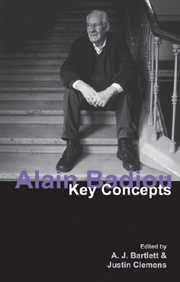Book contents
- Frontmatter
- Contents
- Contributors
- Acknowledgements
- Abbreviations
- Miscellaneous Frontmatter
- Introduction: Badiou's form
- 1 Biography and early works
- PART I THE FOUNDATIONS OF BADIOU'S THOUGHT
- PART II BADIOU'S KEY CONCEPTS OR “CONDITIONS”
- PART III BADIOU'S ENGAGEMENT WITH KEY PHILOSOPHERS
- 10 Plato
- 11 Spinoza
- 12 Kant
- 13 Hegel
- 14 Heidegger
- 15 Lacan
- 16 Deleuze
- 17 New directions
- Afterword: Badiou's futures
- Bibliography
- Index
14 - Heidegger
from PART III - BADIOU'S ENGAGEMENT WITH KEY PHILOSOPHERS
- Frontmatter
- Contents
- Contributors
- Acknowledgements
- Abbreviations
- Miscellaneous Frontmatter
- Introduction: Badiou's form
- 1 Biography and early works
- PART I THE FOUNDATIONS OF BADIOU'S THOUGHT
- PART II BADIOU'S KEY CONCEPTS OR “CONDITIONS”
- PART III BADIOU'S ENGAGEMENT WITH KEY PHILOSOPHERS
- 10 Plato
- 11 Spinoza
- 12 Kant
- 13 Hegel
- 14 Heidegger
- 15 Lacan
- 16 Deleuze
- 17 New directions
- Afterword: Badiou's futures
- Bibliography
- Index
Summary
In setting out the position of his work within the contemporary philosophical environment, Badiou states that his philosophy belongs with that of Heidegger in that it recognizes the necessity of the question of being to the renovation of philosophy. Comparison between the two enterprises is therefore inevitable.
The intervention of Heidegger's first works was to restore ontology to the central place that it had held in the philosophical tradition, showing that, approached from the right angle, its questions reveal a closer link between philosophy and human existence than the theory of knowledge that had displaced it. Despite Heidegger's efforts, it is not clear that ontology has regained its former status within the wider field of philosophy: such force as it retains remains largely tributary to Heidegger's direct influence. This had been the case, at least, until Being and Event.
If Badiou, too, restores the primacy of ontology for an understanding of what philosophy is, he does so, I would suggest, in a largely autonomous way. His project is not conceived primarily as a critique of Heidegger. Badiou's reconception of the questions of ontology goes back to the Greek sources, and to the (relatively marginal) philosophical work in which this tradition was preserved, rather than to Heidegger's thought. This explains why, despite the similarity of the titles – Being and Time, Being and Event – these works do not stand in the kind of close communication and dialogue that one might expect.
- Type
- Chapter
- Information
- Alain BadiouKey Concepts, pp. 146 - 154Publisher: Acumen PublishingPrint publication year: 2010



